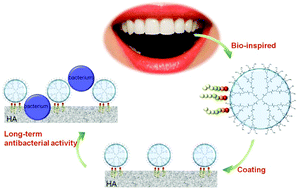Bio-inspired peptide decorated dendrimers for a robust antibacterial coating on hydroxyapatite†
Abstract
Bacterial colonization on implanted biomaterials remains a clinically significant problem. In order to achieve relatively long-term antibacterial activity and reduce the incidence of infections associated with the use of biomaterials, a salivary statherin protein (SSP) inspired poly(amidoamine) dendrimer (SSP-PAMAM-NH2) was synthesized and characterized. PAMAM-NH2 has numerous peripheral amino groups, and thus possesses effective antibacterial activity. The SSP bio-inspired peptide sequence DDDEEKC was conjugated to PAMAM-NH2 since it has a strong capability of adsorbing on hydroxyapatite (HA). Moreover, SSP-PAMAM-NH2 is a zwitterionic polymer possessing cationic amino groups and anionic carboxylic groups, thus it can form aggregates by intermolecular electrostatic interactions, thereby promoting its adsorption on HA. Adsorption tests by ATR-IR, UV, QCM-D, and CLSM, all indicated that SSP-PAMAM-NH2 can tightly adsorb on the HA surface. We found that even after being incubated in PBS for 4 weeks, the SSP-PAMAM-NH2 treated HA disks still retained stable antibacterial activity, while the inhibitory impact of PAMAM-NH2 treated disks had disappeared. Animal experiments also demonstrated that SSP-PAMAM-NH2 could significantly reduce infection of HA implanted into the medullary cavity of rats.



 Please wait while we load your content...
Please wait while we load your content...